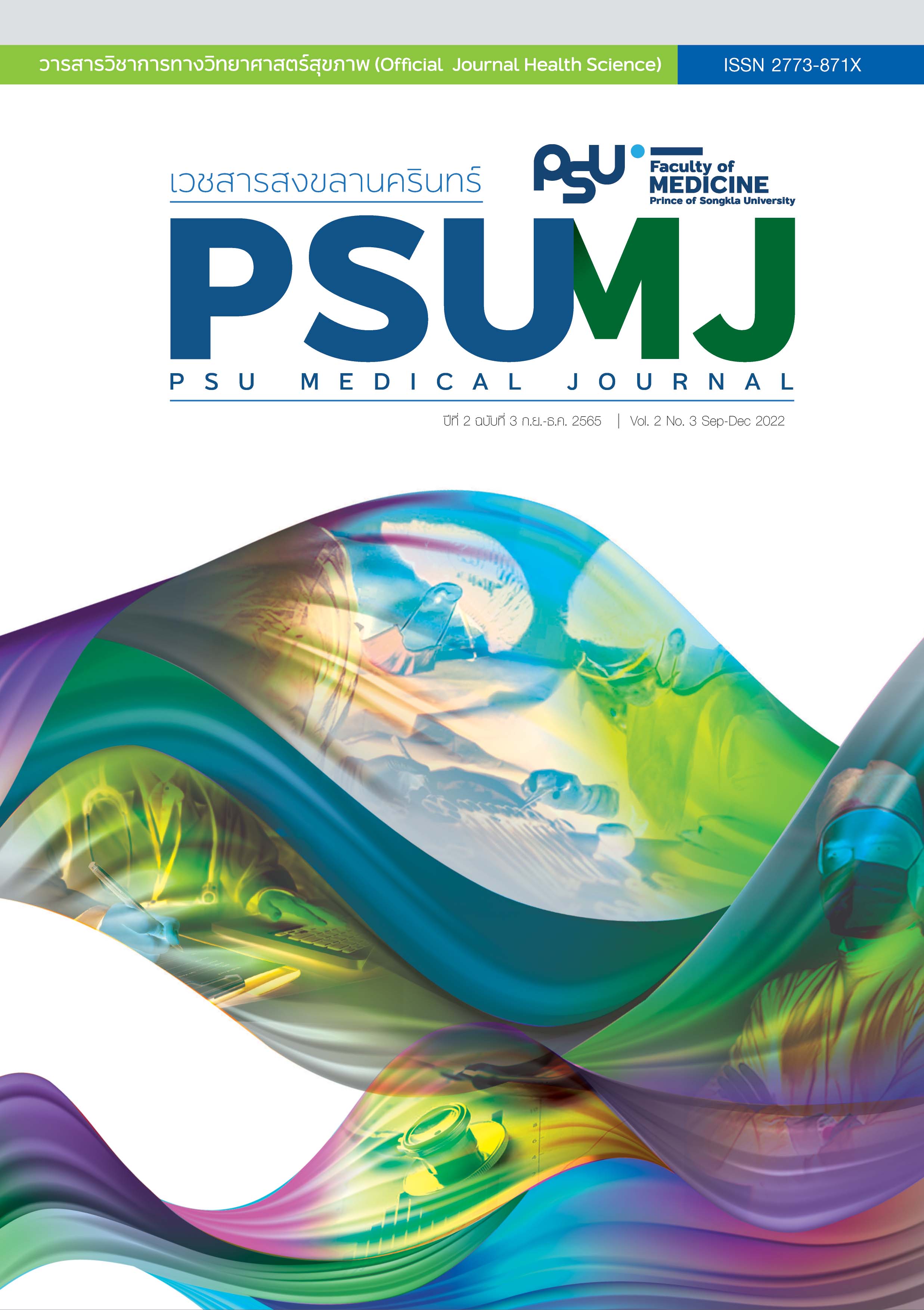Studying Higher Education within Armed Conflict Areas of Thailand: a Study of Post-Traumatic Stress Disorder
DOI:
https://doi.org/10.31584/psumj.2022254215Keywords:
armed conflict, comparative studies, post-traumatic stress disorder, studentAbstract
Objectives: To compare the prevalence of post-traumatic stress disorder (PTSD) symptoms and examine the associated factors between students who studied at campuses located within the areas affected by Southern Thailand’s insurgency, and those in a nearby province.
Material and Methods: This study was of a cross-sectional designed, conducted by self-administered questionnaires; using the Thai version of the PTSD checklist. The subject groups were Prince of Songkla University students who studied at the Pattani Campuses, which are located within the restive areas of Southern Thailand’s insurgency, and Hat Yai Campus, which is in a nearby province.
Results: Of all 897 university students, 454 university students studied in Pattani. The prevalence of PTSD symptoms was 30.8%; which is statistically significant, compared with 17.6% of those who studied in Hat Yai (p-value<0.001). The associated factors, in both groups, were perception of stress from the violence due to the insurgency. Moreover, domicile and intention to resign were significantly associated with PTSD symptoms in the Pattani Campus group. However, gender, religion and satisfaction of university teaching were associated factors among university students at the Hat Yai Campus.
Conclusion: Difference of PTSD symptoms among university students, who studied at the campus located in restive areas and a nearby province, was statistically significant. Both groups reported that perception of stress from the violence due to the insurgency was associated with their PTSD symptoms.
References
Deep South watch. Summary of incidents in Southern Thailand, November 2019 [homepage on the Internet]. Pattani: The School [cited 2020 Jan 1]. Available from: https://deepsouthwatch.org/ en/node/11942.
Jatchavala C, Vittayanont A. Post-traumatic stress disorder symptoms among patients with substance-related disorders in the restive areas of south Thailand insurgency. Songkla Med J 2017;35:121-32.
Mental health foundation. Children and young people [homepage on the Internet]. London: Mental Health Foundation; 2020 [cited 2020 Jan 1]. Available from: https://www.mentalhealth.org.uk/a-to-z/c/children-and-young-people.
Jatchavala C, Vittayanont A, Ngamkajornviwat A. Post-traumatic disorder and resilience in substance-related disorders for patients in the south Thailand insurgency. ASEAN J Psychiatry 2018;19:2231-7805.
Pothisat C. Post-traumatic stress disorder (PTSD) symptoms in children of police officers working in the unrested areas of southern Thailand. J Psychiatr Assoc Thailand 2012;57:323-34.
American Psychiatric Association. Diagnostic and statistical manual of mental disorders. Washington: American Psychiatric Publishing; 2014.
Bryant RA. Post-traumatic stress disorder: a state-of-the-art art review of evidence and challenges. World Psychiatry 2019;18:259-69.
Wu KK, Cho VW, Chow FL, Tsang AP, Tse DM. Posttraumatic stress after treatment in an intensive care unit. East Asian Arch Psychiatry 2018;28:39-44.
Prince of Songkla University. Pattani campus [homepage on the Internet]. Songkhla: Prince of Songkla University; 2020 [cited 2020 Jan 1]. Available from: https://en.psu.ac.th/about-psu/campuses/pattani.
Chawanakrasaesin P, Rukskul I, Ratanawilai A. Validity and reliability of Thai version of the posttraumatic stress disorder checklist. J Psychiatr Assoc Thailand 2011;56:395-402.
Wiwattanaworaset P, Pitanupong J. Prevalence and association factors in posttraumatic stress disorder following a bombing. J Psychiatr Assoc Thailand 2015;60:209-20.
Jaguga F, Mwangi A, Mahugu M, Songole R, Gakinya B, Ayuku D, et al. Post-traumatic stress disorder, major depressive disorder and generalized anxiety disorder, among university students following a terrorist attack in Kenya. East Afr Med J 2018;95:1767-75.
Olff M. Sex and gender differences in post-traumatic stress disorder: an update. Eur J Psychotraumatol 2017;8:1351204.
Jatchavala C, Vittayanont A. King Bhumibol Adulyadej’s sufficiency economy philosophy and post-traumatic stress disorder among higher-education students from the armed conflict region of Thailand. Kesmas 2021;16:207-12.
da Silva HC, Furtado da Rosa MM, Berger W, Luz MP, Mendlowicz M, Coutinho ESF, et al. PTSD in mental health outpatient settings: highly prevalent and under-recognized. Braz J Psychiatry 2019;41:213-7.
Downloads
Published
How to Cite
Issue
Section
License
Copyright (c) 2022 Author and Journal

This work is licensed under a Creative Commons Attribution-NonCommercial-NoDerivatives 4.0 International License.








